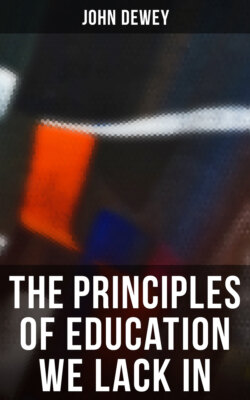Читать книгу The Principles of Education We Lack In - Джон Дьюи - Страница 20
На сайте Литреса книга снята с продажи.
Summary.
Since education is a social process, and there are many kinds
ОглавлениеTable of Contents
of societies, a criterion for educational criticism and construction implies a particular social ideal. The two points selected by which to measure the worth of a form of social life are the extent in which the interests of a group are shared by all its members, and the fullness and freedom with which it interacts with other groups. An undesirable society, in other words, is one which internally and externally sets up barriers to free intercourse and communication of experience. A society which makes provision for participation in its good of all its members on equal terms and which secures flexible readjustment of its institutions through interaction of the different forms of associated life is in so far democratic. Such a society must have a type of education which gives individuals a personal interest in social relationships and control, and the habits of mind which secure social changes without introducing disorder. Three typical historic philosophies of education were considered from this point of view. The Platonic was found to have an ideal formally quite similar to that stated, but which was compromised in its working out by making a class rather than an individual the social unit. The so-called individualism of the eighteenth-century enlightenment was found to involve the notion of a society as broad as humanity, of whose progress the individual was to be the organ. But it lacked any agency for securing the development of its ideal as was evidenced in its falling back upon Nature. The institutional idealistic philosophies of the nineteenth century supplied this lack by making the national state the agency, but in so doing narrowed the conception of the social aim to those who were members of the same political unit, and reintroduced the idea of the subordination of the individual to the institution. 1 There is a much neglected strain in Rousseau tending intellectually in this direction. He opposed the existing state of affairs on the ground that it formed neither the citizen nor the man. Under existing conditions, he preferred to try for the latter rather than for the former. But there are many sayings of his which point to the formation of the citizen as ideally the higher, and which indicate that his own endeavor, as embodied in the Emile, was simply the best makeshift the corruption of the times permitted him to sketch.
